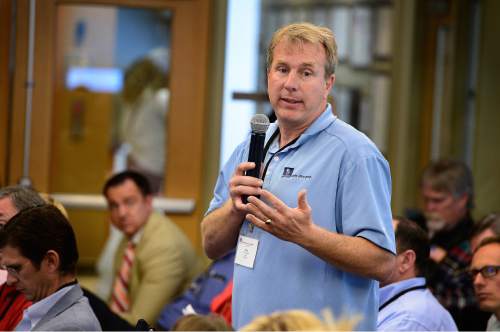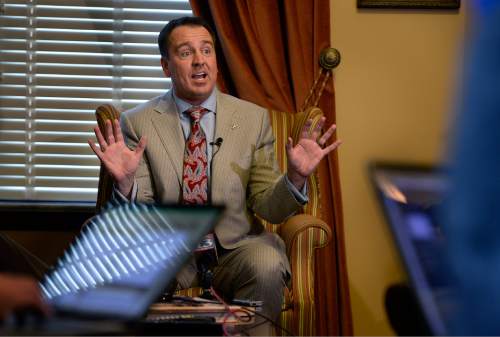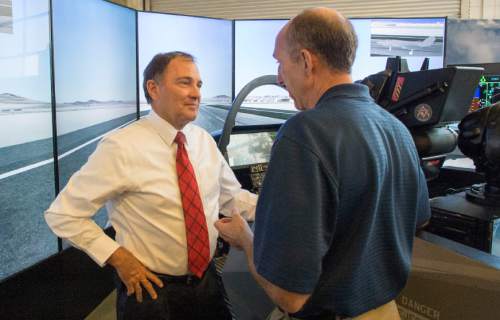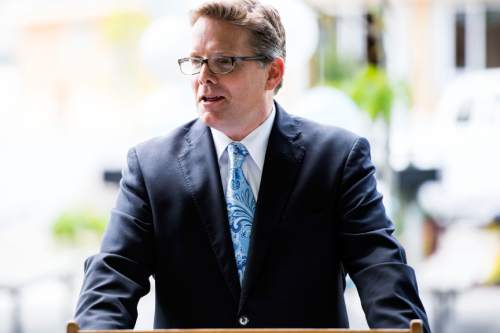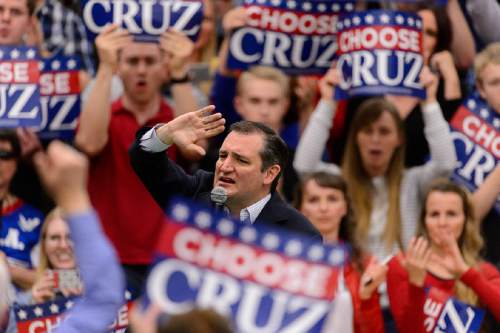This is an archived article that was published on sltrib.com in 2016, and information in the article may be outdated. It is provided only for personal research purposes and may not be reprinted.
Ted Cruz's presidential campaign had a very specific demand for Utah Republicans wanting to be chosen as delegates to the national convention in July — they each had to commit to voting for the Texas senator all the way through the convention, no matter what.
The goal is to cement support for Cruz, should the Republicans head into the convention in Cleveland without a clear-cut nominee.
The Utah delegates to the convention will be bound to support Cruz on the first round of voting because he won the Utah Republican caucus last month. But if no candidate can lock up 1,237 delegate votes, then all bets are off. Delegates will be free to support whom they want, and the jockeying for support will be frenzied and chaotic.
So, to get listed on the "Official Cruz Slate" of delegates, candidates for the spot had to pledge in a two-page questionnaire that they will be able to attend the convention and they will support Cruz throughout the process.
In the end, 37 were chosen, selected with input from local Cruz operatives, advice from those close to U.S. Sen. Mike Lee, and vetting and final signoff by the national Cruz campaign.
The list includes familiar names, including Lee; Gov. Gary Herbert and Utah first lady Jeanette Herbert; Lt. Gov Spencer Cox; U.S. Reps. Mia Love and Rob Bishop; and a few dozen activists and Cruz supporters, such as state Sen. Mark Madsen and former state Rep. Chris Herrod, who helped coordinate the Cruz campaign in Utah.
"Everyone, around election season, says they're for Cruz. So it's just seeing if they really were a Cruz supporter," said Herrod. "The main idea is to find somebody who isn't going to flip on the second round. They're bound [to Cruz] on the first round, so it's just who they're going to support on the second and third round."
But the Cruz pledge doesn't sit well with a group of candidates for national delegates, who say the Republicans' goal going into the convention should be twofold: keeping Donald Trump from winning the nomination and choosing a candidate who can beat Hillary Clinton in the November election.
"To pledge your vote in April to a candidate on every round of balloting is really a betrayal of the process," said Howard Headlee, president of the Utah Bankers Association and a candidate for national delegate.
Headlee, along with former Utah Republican Party Chairman Stan Lockhart, and a handful of other candidates for national delegate are assembling the "Stop Trump, Stop Hillary" slate of candidates, aimed at sending a group of Utahns to the convention in Cleveland who can choose the best conservative candidate to win in November.
If July comes and the candidate who can beat Clinton ends up being Cruz, so be it. If it's not, Headlee said, then it should be up to delegates to pick someone who can win.
"We will never vote for Trump. Ever. It just won't happen," said Headlee. "We then will nominate the best conservative to defeat Hillary Clinton. … If people want to send back some people who have the ability to perform that function at a high level, in a very contentious, exhausting and potentially even violent setting, you've got to send back the A team, without their hands being tied, and that's our message to delegates."
The Stop Trump, Stop Hillary group is still vetting candidates for its slate and, as part of the process, is gathering information about where the roughly 400 contenders for Utah's 40 delegate and 40 alternate delegate slots stand on how to choose a Republican nominee if it does end up being an open convention. They are posting it on the group's Website at http://www.StopTrumpStopHillary.com.
Other alternate slates of candidates are cropping up online as well, including a group of calling itself the TrustTed Slate, that vows to support Cruz on every ballot, but doesn't have the same "establishment" figures, like Herbert and Lee, on the roster.
Utah Republicans will choose the delegates to the national convention at their state gathering on Saturday.
All of this could be moot, of course, if Trump or, less likely, Cruz is able to scrape together the 1,237 delegates needed to lock up the nomination on the first ballot. While some political pundits are siding with Trump, others see an uphill battle ahead of him.
Herbert campaign spokesman Marty Carpenter said the governor signed the pledge to support Cruz at the convention. "He gave his endorsement and is proud to have Sen. Cruz's endorsement, as well," Carpenter said.
Madsen said there wasn't any question that he would sign the pledge to Cruz, because he was one of the first elected officials in Utah to get on the Cruz bandwagon, right after Kentucky Sen. Rand Paul dropped out of the race.
"I understand the importance of a head count. I understand the importance of what we're going into and I want to telegraph as much as I can where my loyalties lie and try to persuade others to come with me," Madsen said. "If somehow he's not in contention, then you go with the options that are in front of you, but as long as he's in the running … then a commitment like that is helpful to the campaign."
House Speaker Greg Hughes, R-Draper, was perhaps Trump's most prominent supporter during the Utah caucuses — at least after Florida Sen. Marco Rubio dropped out of the race — but he said he would support Cruz on each ballot if he's elected to serve as a delegate, even though he wasn't on the Cruz-endorsed slate of candidates.
"Having seen the voice of the caucuses and how overwhelmingly strong the support is for Cruz, I'm more than comfortable, if I was a delegate, to support that sentiment at the national convention. I'm not there to be a Trump person," Hughes said.
Nonetheless, Hughes said, "I don't have high expectations" of being elected.
Twitter: @RobertGehrke


